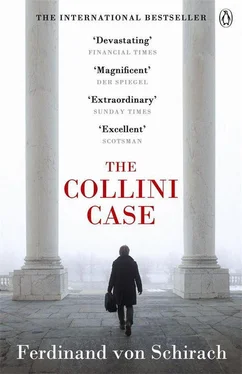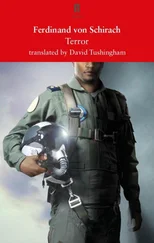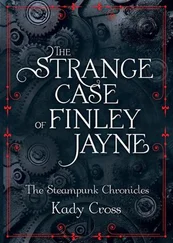‘Hey, that’s a handsome dressing gown, Philipp,’ she said. ‘And such a bright yellow…’ Then she turned to Caspar. ‘You must be Caspar,’ she said with composure. He blushed. She leaned forward so that he could kiss her on the cheeks, and he got a glimpse of her white bra. Her face was still cold. Like Philipp, she was tall and slender, but everything that was lanky about him looked elegant in her. She had the same dark eyes and arched eyebrows as her brother, but the mouth in her pale, clear face was soft and humorous. She was only a few years older than Caspar, but she was grown up and unattainable.
She spent the next two days almost constantly on the phone to her friends in England; you could hear her laughter all over the house, and her father was cross because the line was always engaged. When she went back she left a void behind her, although no one but Caspar seemed to notice it.
Next summer Philipp got his first car, a red Citroën 2CV with white seats. It was the last holidays before their final year at school, when they would be taking the school-leaving exam. As usual the two of them worked on the production line in the Meyer Works for the first half of the holidays and spent their earnings in the second half. They took the car over the Brenner Pass to Venice. Philipp’s great-grandfather had bought an art nouveau villa on the Lido there in the 1920s. Once they had seen all the museums and churches, the days soon merged into each other: they sailed on the lagoon, played tennis and spent the afternoons in beach cafés, on hotel terraces, or lying in the long, dark green shadows on the quay wall. In the evening they took the water bus to Venice, went to the bars in Cannaregio, and strolled at leisure through the nocturnal streets. They were hardly ever back before early morning, when they would sit on the terrace for another hour, listening to the cry of the seagulls, and all was well with their world.
At the end of the holidays Johanna came from London for a week’s visit. On the day of her departure, she was lying beside Caspar after they had been swimming. She propped herself on her elbows, her hair falling over her face. Suddenly she bent over him and looked into his face. He closed his eyes, feeling her wet hair on his forehead; she kissed him on the mouth, and their teeth clashed. ‘Don’t look so serious,’ she said, laughing, and put her hand over his eyes. Then she ran off, back to the sea, turned once again and called, ‘Come on, then!’ Of course he didn’t, but he watched her go, and later he couldn’t remember ever being so happy as on those clear blue days beside the sea.
Just under a year later, the boys took their final school exams. After the end-of-year celebrations, Philipp’s parents came to drive their son home from the boarding school. On the last bend before you reached the sign saying Rossthal, a low-loader truck laden with timber stood right across the road. It had come out of a field path and had been trying to turn in the narrow lane. The Meyers’ car went right under the articulated truck, and the tree trunks it was carrying sliced the car roof off. Philipp’s head was torn from his body, and his parents bled to death in the road.
The funeral was held in Rossthal. In church, the priest said what a good son Philipp had been, and what a good grandson, and what a great future he would have had. He didn’t mention the fact that the coffin remained closed because the dead body had no head. The priest wore mauve-framed reading glasses; he stood in front of the congregation making the sign of the cross in the air; he spoke of a better world than this. Caspar felt sick. He left the church before Mass was over. Outside, the gravediggers stood in their suits beside the timber struts on which they would place the coffins later. They were smoking and talking, and they were alive. When they saw Caspar they dropped their cigarettes on the earth and ground them out. He didn’t want to disturb them, so instead he went to the funerary chapel in the cemetery. He sat down on a marble bench and watched the burial from there in the faint light.
Hans Meyer was burying his son, his daughter-in-law and his grandson. He stood rigid beside the graves, supported by Johanna. He received condolences for four hours on end, saying a few friendly words to everyone. Then he went home and shut himself up in his study. Johanna had herself driven straight to the airport; she didn’t want to talk to anyone.
Caspar went to see Hans Meyer in his study that evening. He asked the old man if it would be an idea to play chess as they used to. They played in silence, until after a while Hans Meyer stopped. He opened the window and looked out at the dimly lit park.
‘This is something that happened when I was a little boy, maybe eight or nine years old,’ said Meyer. He spoke without turning round. ‘I had a red-and-blue shirt. Really bright colours; I’ve no idea what material it was. My uncle had brought it back from Italy. I put my new shirt on and went over to the riding stables. I was there almost every day at the time; I liked the horses a lot. Out in the paddock I saw my mother’s showjumper, a nervous animal. It had already won at a number of shows, and my mother thought she stood a good chance of taking it to the Olympic Games in a few years’ time. Maybe I just wanted to pat the horse that day – I’d often done that before, but I don’t remember now. Anyway, on seeing me the horse reared up and ran into the wooden fencing of the paddock. It took fright, broke its left foreleg and screamed with pain. Horses can scream horribly, and I’d never heard anything like it before. I put my hands over my ears and ran away. That afternoon the forester came and put the poor animal out of its misery.’
Hans Meyer turned. He was shedding silent tears, but his voice was steady. ‘That evening I was summoned to my father’s study. I sat just where you’re sitting now, at that desk. Parents didn’t talk to their children much in those days. I loved my father, but I was afraid of him. He said I was to blame for the death of the horse, for causing it to die before its time. And I should take better care of what was entrusted to me in future. “Before its time”, those were his words. My father didn’t punish me. He said I ought to think about the horse’s death… A few days later, it was buried in the park by the lower lake. Not the whole horse, of course, only its hooves.’
‘I know. Philipp showed me the place once.’ Caspar looked at the old man, his friend. ‘But it wasn’t your fault,’ he said.
‘What do you mean?’
‘Your shirt couldn’t have frightened it. Horses don’t see colours. They see in black and white, that’s all.’
Hans Meyer leaned on the back of the chair; he smiled. ‘Well, it’s nice of you to say that, Caspar. But it’s not true. Horses can see red and blue.’
The old man passed the back of his hand over his eyes. He returned to the window, opened both panes and stood leaning against the frame. Caspar got to his feet and went over to him. Hans Meyer turned round and gave Caspar a hug. Then the old man said he’d like to be alone now. When Caspar drove home next morning, he found the old chess set on the passenger seat of his car.
After the time lost to his military service, Leinen began studying law in Hamburg. He had changed since Philipp’s death: he was quiet these days, things seemed strange to him. He often had a sense of being removed from himself, observing himself from the outside, and moving his body as if by remote control. At such times he thought he might have inherited the dark side of his father’s character.
He had been back to Rossthal only once since the funeral, when Johanna invited him to her wedding four years after his friend’s death. She was marrying an Englishman twenty years her senior who had been her professor at Trinity College, Cambridge; a kindly man with white eyebrows. Everyone thought him entertaining and charming. When Caspar offered his congratulations outside the church after the wedding ceremony she whispered in his ear, saying how much she missed Philipp, and caressed his cheek. He held her arm tightly, kissed the palm of her hand, and for a brief moment he thought that as a couple they might yet be saved.
Читать дальше












